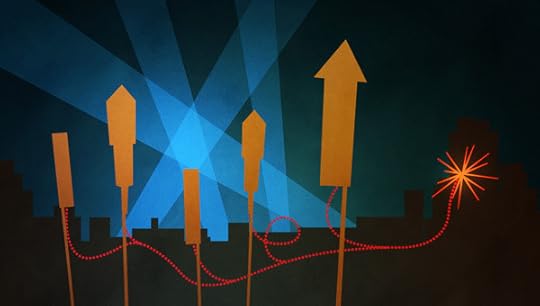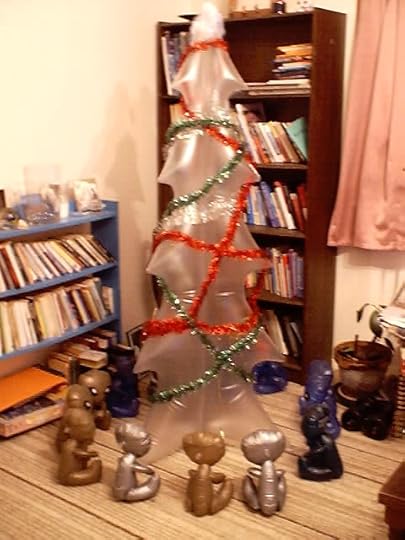Janis Freegard's Blog, page 22
February 13, 2012
The Scottish Poetry Library
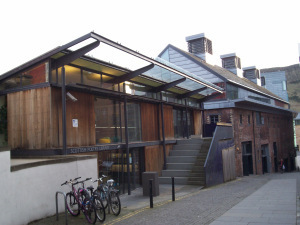
Scottish Poetry Library
A highlight of our recent trip to Edinburgh was the Scottish Poetry Library – a lovely tranquil space where you can while away the hours browsing the shelves, checking out the poetry magazines, buying the odd book, writing your own poetry or being impressed by the lovely little sculptures made out of books that have been anonymously appearing there. There were more to be found at the Writers Museum. Well worth a visits if you're in Edinburgh and you like poetry (or little paper sculptures made out of books). Best to check the opening times first, if you're planning to drop by. I gather there are other poetry libraries in London (South Bank Centre) and Morpeth, Northumberland (the Northern Poetry Library). Something else to look forward to exploring.








February 6, 2012
Tuesday Poem – ‘Night Watch’ by Dave Alton
Night Watch
Town of a thousand holes, at the bottom
Of each a dark boggart lurks, cunningly
Creating mischief for careless souls who’re
Simply passing. Urban plastic tendrils
Squirm, coil and wrap around the bed-ridden
Riding alive through comatose dreaming.
All the while tower blocks round and about
(Facades irritated by rashes of light,
Scratched by bitter wind, hardly soothed with rain )
Pluck up their concrete roots and, like golems,
Lurch along through pedestrian precincts,
Passed shops and stores blinded by steel shutters
Billed with vainglorious posters proclaiming
Imminent revolution, this week’s sales,
Or the immanence of God and the end
Of Days. Even as ungainly tower blocks
Retreat beyond traffic lights, boggarts
Emerge from excavations flimsily
Fenced round with barbers’ poles, in such a way
Shadows might ease free from corporeal
Bodies responsible for casting them.
Night is the product of curtains being drawn
Against streets that have to be abandoned
To darkness, light so selfishly horded
In living rooms, in the eyes of voyeurs
Who do not realise televisions
Are vampires existing by sucking life-time
From fascinated victims. Far too late
They switch off, for it’s bed time, deathbed time.
The night watch is running slow, leaden hands
Weighing every heavy second, holding
Each one just too long, making the minutes
Fall behind the clock. A hospital cot
Easily contains these remains of a man,
So little of him left, his shadow gone.
Even breath can be no longer his own,
Generous town sharing its air with him
Via one of those serpentine urban tendrils
Worming its way through the wall to his nostrils.
Hardly a burden with so little left
Him to draw from his account. Family
Come and sit and sit and go in relays
Of concern, keeping his lips barely moist
With final kisses and cool water soaked
Into pink sponge swabs on thin lollysticks
Looking like unspun candyfloss. Night watch
Knits or reads or plugs into World Service
While drowsing on the one comfy armchair.
For all that time is tardy dawn still comes,
Shift changes, while night and day will remain
All the same to him even as tower blocks
Step back into place, boggarts burrow back
Into earth and the curtains are drawn back,
Back and back, releasing light from their rooms
To illuminate awakening streets
And the living realising they still are.
Dave Alton is a Newcastle-based poet who was a member of the Tyneside Poets in the 1970s. He is joint editor (with Keith Armstrong – see last week’s post) of the Poetry Tyneside blog,which publishes contemporary poetry and examples from the archives of “Poetry North East”.
As well as performing his poetry and being published in magazines and newspapers, Dave has co-edited two collections of young people’s writing under the title Don’t Tell My Friends, and has written scripts for pantomimes. Dave is also a regular contributor of spoken ballads to the monthly podcast Folkcast , developing traditional folk tales, many from the North East of England, into verse.
Dave made links with the New Zealand Poetry Society on a recent visit to New Zealand and is including NZPS poets on the Poetry Tyneside blog. If you would like to contribute a poem, please email two or three poems to tynesidesubs at hotmail dot co dot uk
Dave was kind enough to arrange for Peter and I to meet up with him and fellow poet Keith Armstrong (who featured in last week’s post) on our recent trip to the UK.

Dave Alton at the Bridge, Newcastle








Tuesday Poem – 'Night Watch' by Dave Alton
Night Watch
Town of a thousand holes, at the bottom
Of each a dark boggart lurks, cunningly
Creating mischief for careless souls who're
Simply passing. Urban plastic tendrils
Squirm, coil and wrap around the bed-ridden
Riding alive through comatose dreaming.
All the while tower blocks round and about
(Facades irritated by rashes of light,
Scratched by bitter wind, hardly soothed with rain )
Pluck up their concrete roots and, like golems,
Lurch along through pedestrian precincts,
Passed shops and stores blinded by steel shutters
Billed with vainglorious posters proclaiming
Imminent revolution, this week's sales,
Or the immanence of God and the end
Of Days. Even as ungainly tower blocks
Retreat beyond traffic lights, boggarts
Emerge from excavations flimsily
Fenced round with barbers' poles, in such a way
Shadows might ease free from corporeal
Bodies responsible for casting them.
Night is the product of curtains being drawn
Against streets that have to be abandoned
To darkness, light so selfishly horded
In living rooms, in the eyes of voyeurs
Who do not realise televisions
Are vampires existing by sucking life-time
From fascinated victims. Far too late
They switch off, for it's bed time, deathbed time.
The night watch is running slow, leaden hands
Weighing every heavy second, holding
Each one just too long, making the minutes
Fall behind the clock. A hospital cot
Easily contains these remains of a man,
So little of him left, his shadow gone.
Even breath can be no longer his own,
Generous town sharing its air with him
Via one of those serpentine urban tendrils
Worming its way through the wall to his nostrils.
Hardly a burden with so little left
Him to draw from his account. Family
Come and sit and sit and go in relays
Of concern, keeping his lips barely moist
With final kisses and cool water soaked
Into pink sponge swabs on thin lollysticks
Looking like unspun candyfloss. Night watch
Knits or reads or plugs into World Service
While drowsing on the one comfy armchair.
For all that time is tardy dawn still comes,
Shift changes, while night and day will remain
All the same to him even as tower blocks
Step back into place, boggarts burrow back
Into earth and the curtains are drawn back,
Back and back, releasing light from their rooms
To illuminate awakening streets
And the living realising they still are.
Dave Alton is a Newcastle-based poet who was a member of the Tyneside Poets in the 1970s. He is joint editor (with Keith Armstrong – see last week's post) of the Poetry Tyneside blog,which publishes contemporary poetry and examples from the archives of "Poetry North East".
As well as performing his poetry and being published in magazines and newspapers, Dave has co-edited two collections of young people's writing under the title Don't Tell My Friends, and has written scripts for pantomimes. Dave is also a regular contributor of spoken ballads to the monthly podcast Folkcast , developing traditional folk tales, many from the North East of England, into verse.
Dave made links with the New Zealand Poetry Society on a recent visit to New Zealand and is including NZPS poets on the Poetry Tyneside blog. If you would like to contribute a poem, please email two or three poems to tynesidesubs at hotmail dot co dot uk
Dave was kind enough to arrange for Peter and I to meet up with him and fellow poet Keith Armstrong (who featured in last week's post) on our recent trip to the UK.

Dave Alton at the Bridge, Newcastle








January 30, 2012
Tuesday Poem – Splinters, by Keith Armstrong
Splinters
(For My Father), by Keith Armstrong
You picked splinters
with a pin each day
from under blackened fingernails;
shreds of metal
from the shipyard grime,
minute memories of days swept by:
the dusty remnants of a life
spent in the shadow of the sea;
the tears in your shattered eyes
at the end of work.
And your hands were strong,
so sensitive and capable
of building boats
and nursing roses;
a kind and gentle man
who never hurt a soul,
the sort of quiet knackered man
who built a nation.
Dad, I watched your ashes float away
down to the ocean bed
and in each splinter
I saw your caring eyes
and gracious smile.
I think of your strong silence every day
and I am full of you,
the waves you scaled,
and all the sleeping Tyneside streets
you taught me to dance my fleeting feet along.
When I fly, you are with me.
I see your fine face
in sun-kissed clouds
and in the gold ring on my finger,
and in the heaving crowd on Saturday,
and in the lung of Grainger Market,
and in the ancient breath
of our own Newcastle.
Keith Armstrong was born in Newcastle upon Tyne, where he has worked as a community development worker, poet, librarian and publisher. He now lives in the seaside town of Whitley Bay and is coordinator of the Northern Voices creative writing and community publishing project which specialises in recording the experiences of people in the North East of England. He has organised several community arts festivals in the region and many literary events. He was founder of Ostrich poetry magazine, Poetry North East, Tyneside Writers' Workshop, Tyneside Poets, East Durham Writers' Workshop, Tyneside Trade Unionists for Socialist Arts, Tyneside Street Press and the Strong Words and Durham Voices community publishing series. He has compiled and edited books on the Durham Miners' Gala and on the former mining communities of County Durham, the market town of Hexham and the heritage of North Tyneside. He completed a doctorate on Newcastle writer Jack Common at the University of Durham in 2007. His poetry has been extensively published in magazines such as New Statesman, Poetry Review, Dream Catcher, Other Poetry, Aesthetica, Iron, Salzburg Poetry Review and Poetry Scotland, as well as in the collections The Jingling Geordie, Dreaming North, Pains of Class and Imagined Corners, on cassette, LP & CD, and on radio & TV. He also has an extensive record of poetry performance throughout Europe and beyond.
We met Dr Armstrong on our recent visit to the UK, through another Tyneside-based poet, Dave Alton. Dave and Keith were kind enough to introduce us to local bars The Bridge and The Red House – recommended if you're over that way.
Dave Alton, Keith Armstrong, Janis Freegard, Peter Clayworth at The Bridge, Newcastle Photo: Peter Dixon
You can read the other Tuesday poems here.








January 24, 2012
What I did in my holidays
Click to view slideshow.
We were lucky to hit surprisingly mild weather – one or two frosty mornings, but mostly crisp and sunny. Perfect for walking about in if you're well rugged up.








January 11, 2012
2011 in review
The WordPress.com stats helper monkeys prepared a 2011 annual report for this blog.
Here's an excerpt:
The concert hall at the Sydney Opera House holds 2,700 people. This blog was viewed about 11,000 times in 2011. If it were a concert at Sydney Opera House, it would take about 4 sold-out performances for that many people to see it.
Click here to see the complete report.

December 22, 2011
Ho Ho Ho
December 14, 2011
Interview with Tim Jones
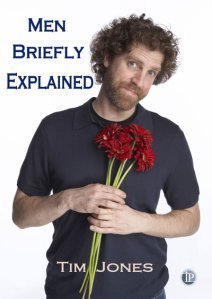
I'm delighted to be interviewing poet, novelist and short story writer Tim Jones about his latest collection of poetry, Men Briefly Explained, as part of his virtual book tour. (And no, that's not Tim pictured on the cover, but there is a photo of him at the bottom of this post.) It's a very enjoyable book, which I've already read twice and intend to read again.
Tim's previous publications include poetry collections Boat People and All Blacks' Kitchen Gardens, short story collections Transported and Extreme Weather Events, and a novel, Anarya's Secret. He is also co-editor of Voyagers: Science Fiction Poetry from New Zealand, which won "Best Collected Work" in the 2010 Sir Julius Vogel Awards, the same year he was awarded the NZSA Janet Frame Memorial Award for Literature.
First of all, Tim, how did your recent "real-world" book tour go? Any particular highlights?
The highlight of the whole tour was meeting up with friends – both people I already knew in person and enjoyed catching up with again, and people, especially poets, I knew only from the Internet before this.Of all the launch events, I think the Friday night event at the Rona Gallery in Eastbourne, which is part of Lower Hutt in local body terms but feels to me a lot like the seaside suburbs of Wellington, was my favourite. The staff are friendly and knowledgeable (plus there are two Tuesday Poets within their ranks!), the venue is great: you walk into an excellent bookshop and, at a certain point, it morphs into an excellent gallery – what's not to like? There was a good crowd who laughed at all my jokes (which is, of course, the true measure of success!), books were bought and nibbles nibbled – it was a really good time.But another highlight (and it is so strange for me, an avowed South Islander, to be selecting only North Island highlights) was to read poetry for the first time in Auckland. I wasn't at my best by by that stage, as I had picked up a cold, I was tired, and the rain was bucketing down, but I have always been nervous about reading in Auckland, and it felt good to break through that particular barrier. It was good of PoetryLive to let Keith Westwater, Dr David Reiterand I be part of their regular weekly readings series.
How does this latest book fit into your body of work to date? Is it a departure from or a continuation of themes from your previous collections?
There have been poems about men, masculinity and growing up male in each of my two previous collections, Boat People and All Blacks' Kitchen Gardens. The difference this time is that, having initially put together a number of such poems as a chapbook (which I was going to called "Guy Thing" – I'm glad I changed the title!), I then decided to go on and write more poems around these themes, rather than (as in my previous collections) having a collection with several sections, each devoted to a theme or style of poem.
The other difference is that my two previous collections each had a section of science fiction and speculative poetry, whereas this one doesn't – I guess only "As you know, Bob" and "In A World Without Pity, A Town Without Fear" would qualify as speculative poetry. I've just joined the Science Fiction Poetry Association, and even guest-edited an issue of their online magazine Eye To The Telescope this year, so I think this is a temporary aberration – perhaps not much science fiction is needed to explain men!
I gather that these poems were written over a five-year period. Did your approach to writing poems about men change as you went along?
As noted above, having initially discovered that I was writing a number of poems about men and planning to bring them together in a chapbook, I then decided to go for a collection. I don't usually write with a theme in mind before I start – I usually write first, and look for themes later – so this took a bit of adjustment. Once I got underway on these poems, especially the ones about older men near the end of the book, though, I found that they came quite quickly and relatively easily.
I think I might try writing more themed collections in future – in fact, I have a couple of possible themes in mind for future poetry collections, plus another chapbook idea. I like chapbooks a lot – I am determined to put one together at some point.
You write award-winning fiction as well as poetry. Do you work on your various projects concurrently or sequentially?
I find that I can't work on a novel and short fiction at the same time, but I have at times been able to work on fiction and poetry at the same time – well, say, a morning on one and an afternoon on the other. I'm concentrating on short fiction at the moment – I went through a nervous time when there seemed to be a blockage between the short story ideas I had squirrelled away and my ability to turn them into stories, but I feel (I hope) as though the knack is beginning to return.
I have many favourites in this book: poems about love, like happened to meet and Honey Moon ; Return to Nussbaum Reigel ; and the very entertaining Men Briefly Explained :
"My friend and I are talking at
the most attractive woman in the room.
We're talking big: theories, hypotheses,
each wilder than the rest.
How huge our brains must be!"
What's your own personal favourite?
That's a tough question, because it's like being asked to choose between one's children. Then again, I only have one child, so [puts names of poems on folded slips of paper in hat, swirls slips of paper around, without looking, pulls out a slip] … my favourite poem is "Thinning"! It's kind of gloomy and I stopped reading it at readings because it was depressing everyone too much, but I'm particularly pleased with that one. My favourite poem to read out loud is "Men Briefly Explained" itself – I've noticed that it's mainly women who appreciate that one.
What's next on the writing agenda?
Another collection of short stories, and again, I have a theme in mind as I write them. Right now, I have a couple of published but uncollected stories that fit with the theme, a couple more completed but unpublished stories, and a whole bunch of first drafts, bits of stories, and story ideas – which sometimes consist of no more than a title! So there is a lot to do yet, but I'm enjoying the process.
Links to more interviews on Tim's virtual book tour here.
How To Buy A Copy Of Men Briefly Explained (a perfect Christmas gift for a poetry fan near you!)
Men Briefly Explained is published by Interactive Press (IP) of Brisbane. You can find out more about Men Briefly Explained, and buy it direct from the publisher, on IP's mini-site for the book: http://www.ipoz.biz/Titles/MBE.htm
On Tim's Men Briefly Explained page, there are more options for buying the book in person and online, plus latest reader reactions and reviews: http://timjonesbooks.blogspot.com/p/men-briefly-explained.html

December 1, 2011
What happens when vegetable gardens are left to their own devices
November 28, 2011
Kingdom Animalia Reviews
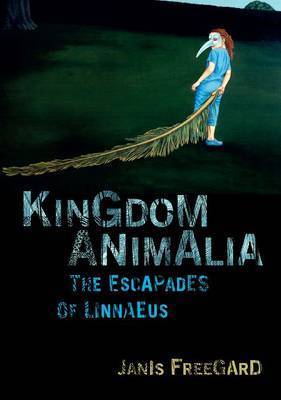
painting by Mary McIntyre
The latest reviews of Kingdom Animalia: the Escapades of Linnaeus come from Emma Neale in the NZ Listener (December 3 -9 2011):
"…Freegard is equal parts jester and scientist…the collection is as much about human follies, infringements, betrayals and tenderness as it is about the habits and habitats of our animal cousins."
Sarah Jane Barnett in Landfall:
"There is a lot to enjoy in Kingdom Animalia. Freegard's poetry is sharp and funny; she is the poet next door who I immediately like."
and Joanna Preston in A Fine Line (the NZ Poetry Society newsletter):
"At its best, Kingdom Animalia is delicious – often funny, frequently touching, unmistakeably modern, and full of swerves and quirks and strange reverses."
Earlier reviews had this to say:
Paula Green in the NZ Herald (1 November 2011):
"…Freegard has glued the breach between poetry and science with lyricism, inventiveness, research, playfulness and miniature bursts of storytelling. Fascinating."
http://www.nzherald.co.nz/books/news/article.cfm?c_id=134&objectid=10763178
Patricia Prime in Takahē 73 (Winter 2011):
"…Freegard's is a restless poetry, expressing contemporary angst within a context of travel, or analyzing the stopping-places, trying to see clearly, and identifying with the flora and fauna. Yet there is also a need to try and anchor the poems to the modern world."
http://www.takahe.org.nz/review/Takahe73KingdomAnimalia.pdf
Tedi Busch in the Nelson Mail (30 July 2011):
"…The author's imagination is infinite. In just one piece a witch teaches her to fly like a humming bird while advising a man from Japan about his cup of spaghetti and notes that our minds have minds of their own. Hers certainly does; I think I'll go and read this all over again."
and Hamesh Wyatt in the Otago Daily Times:
"…There is plenty of subversive humour and a little self-indulgence but never a dull moment. …….Kingdom Animalia: The Escapades of Linnaeus will get under your skin something fierce. It's neat to have something brand-new and shiny."
http://www.odt.co.nz/entertainment/books/164172/plenty-evidence-osullivans-lesson
Other links:
An interview about the book with Veronika Meduna on 'Our Changing World' poetry-and-science.asx
and with Tim Jones on his blog.
Kingdom Animalia also has its own Facebook page.





